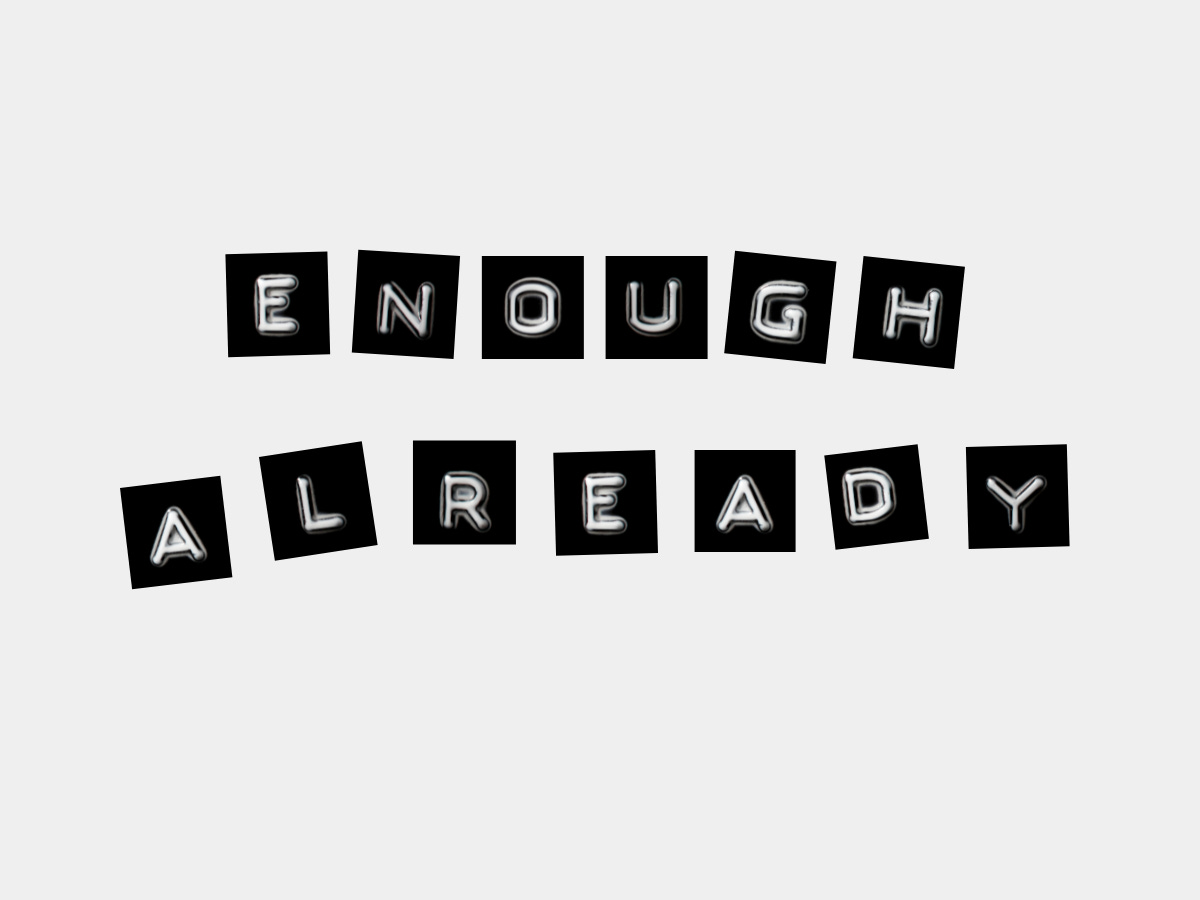
This year, enough-ness has been weighing on my mind. And rightly so. Be it conversations with friends nonchalantly dropping little enough-ism’s, or my own introspective contention with both being enough and having had enough, the topic feels ever important—perhaps even imperative.
I was reading a guest article by on ’s brilliant Substack The Hyphen— and the topic of “enoughness” I don’t get into Bree’s beautiful and brilliant “Most Days” Theory in depth, but I would definitely endorse reading into it. What stuck to me like glue were her words: “I decided I wanted to live a life of enoughness.” And all I could mumble to the sea staring at me as I read these glorious words was, “Yes, Bree, YES!”
We all have those ideas or musings that simmer in us like water in a kettle waiting to boil. Be they wild ones we’re afraid to saddle ourselves to, or meddlesome ones that challenge how we view the world, these ideas—perhaps more complexes—are always there under the surface. The topic of “enough” is exactly the kind I’m speaking of, a song of a pondering that’s been waiting for me to let it sing. So what better day than today to write, to let this tome—or let this question—reverberate in my mind:
What makes us think we’re not enough ?
The funny thing is, we are born enough. It’s a birthright. Yet we are naïve enough to question that truth, and it starts all too young. I think back to the early days on the playground, and the kids not picking you for their team. There the questions begin: Am I not good enough? And the questions continue as we age: Am I not young enough? Yet, we buy things “as is,” because even used, or showing wear, we find value in possessions—but what about people? We may be worn in, but we are worthy, perhaps even more valuable as we age. Or so I like to think.
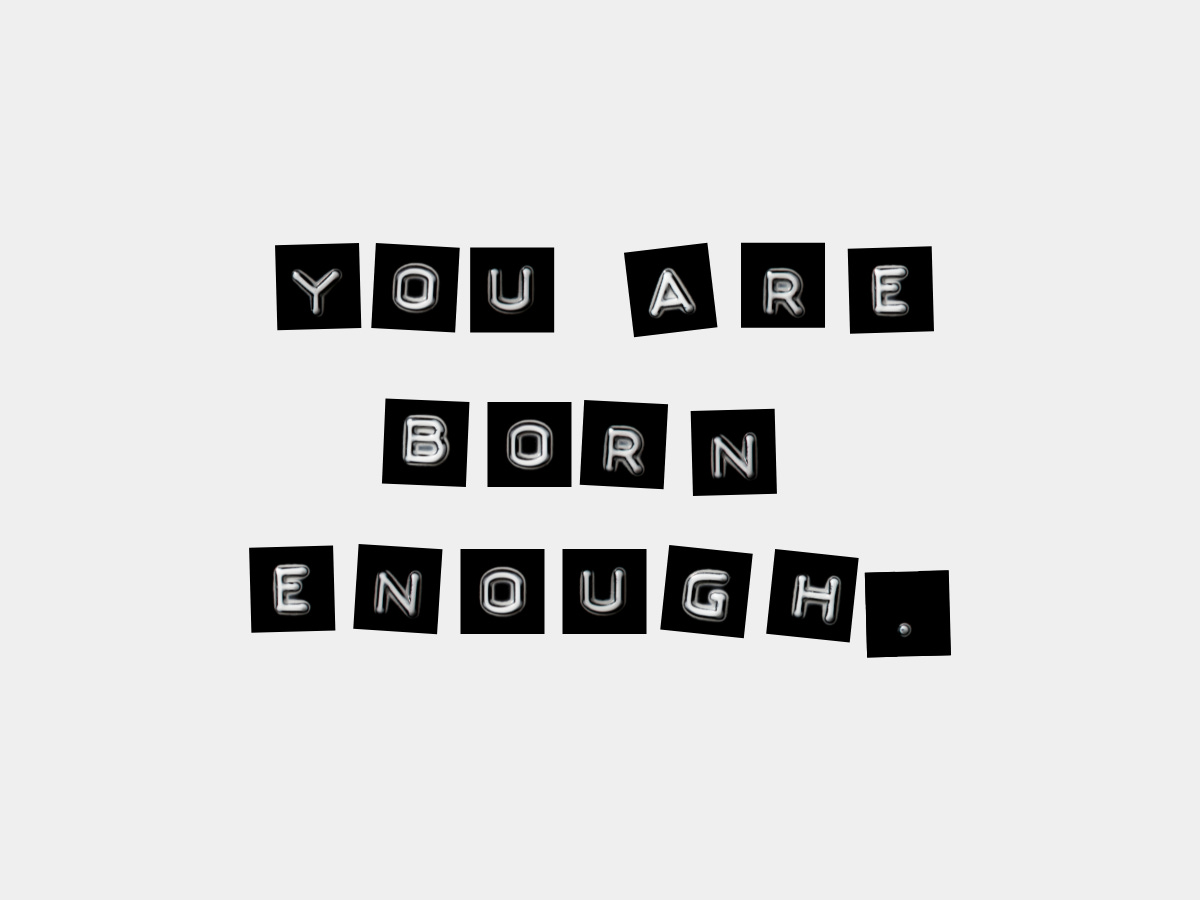
Being Enough
Where did we get the idea that we aren’t enough ? The etymology of the word tells us we’ve been considering what is enough since c. 1300. The word comes from Old English genog meaning "sufficient in quantity or number.” Essentially being enough originated in quantity, not quality. So when did we start using it as a qualitative measure? I mean, you were born one body, which is enough. If you were born as two bodies, or if there were two of you, maybe we would think—okay a little too much. But one is just right, even if you don’t have all ten fingers and ten toes.
The reality is, we have come to intertwine our being with our enoughness. So no matter how we count it, we are destined to experience the entrapment of “not (fill in the blank) enough.” Not good enough, not smart enough, not pretty enough, not accomplished enough—oh, I have a good one—not experienced enough. The list is endless, but when are we enoughless?
“I don’t think I’m good enough” is such a recurring statement, but it should more of a question. The question remains, how are we even doubting our enough? If we humor this question, where is the ruler we use, what barometer—news flash, there is none. My feelings are, if we are measuring up against make believe metrics we can never begin to measure up.
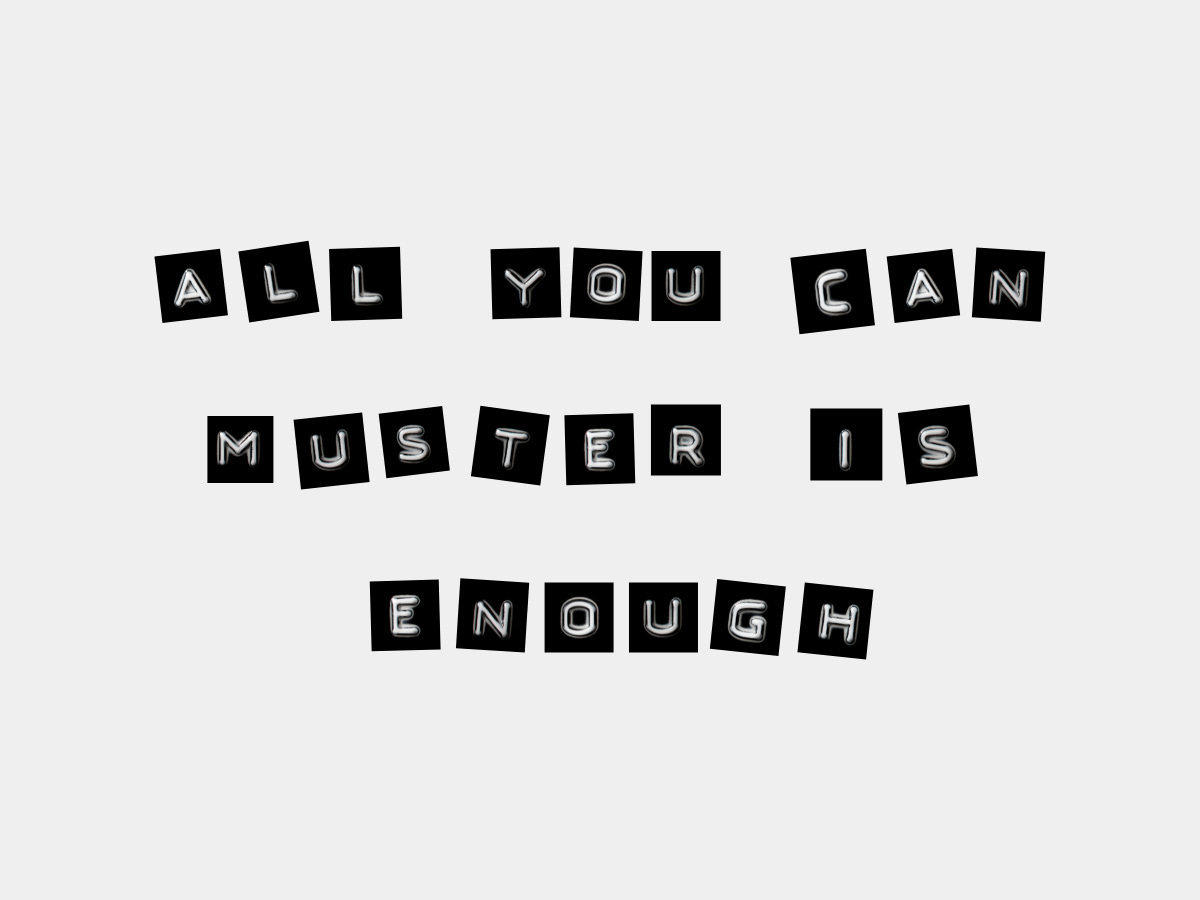
Doing Enough
Back to the discussion that propelled this post, and “living a life of enoughness.” (Thank you again,
for the noggin nudge!) There is so much sewn into this statement, and Bree’s “Most Days” Theory. It’s laced with a subtle but rich message, one we all know too well: perfectionism isn’t it. We can try our best, but there is no “perfect”—no matter how you slice it. As always, open for debate in the comments here, but unless we are getting super philosophical, when it comes to everyday life, perfect isn’t a conspirator—it’s an impossible proposition. Which leads us back to that E-word we’ve been swimming in. What if we evaluated our productivity less on done-ness, and more on enoughness? Done enough.I know one of my biggest personal growth lessons these past few years has been not admonishing myself for my actions not matching up with my intentions. Letting myself lose the battle (which if it’s a battle to begin with maybe the whole thing she be revisited, but for now let me be up in arms), so I can win ‘Most Days’ is such a refreshing way of living. Instead of pushing myself past my limits to make 7/7 days of yoga, or 1 minute meditating, whatever it may be, I let myself revel in the fact that I made 4 or 5 or even just 1 day. And instead of getting lost in the checkboxes I tick, I find myself celebrating the fact that I am letting myself say no today. Goals be damned, or at least snoozed for another day. Today I did enough, even if it felt like so much less than I had initially aspired for. Today was enough as it was. What I was able to accomplish was all I could muster for the day, or all I could do with what I was given, and THAT is always enough loves.
Having Enough
“A meaningful life isn’t in the clutter of “more”… It’s in the simplicity of enough. 🤍 “- Pamela Anderson. Oh Pamela you and your wisdom keeps finding me in Substack, and I really do love it. I hope it’s you, and not a ghostwriter, but I have a sneaking suspicion it is really, really you.
I read this a few weeks ago, and the whisper of enough compelled me to bookmark her words. And so I must discuss this equally important degree of enough. In a world where we are inundated by messages and e-mails, dishes and laundry, counters to clean and shelves to dust, having too much comes at a cost. Ironic, considering we pay for physical things or invest our time into them, which ends up costing us more post-purchase. Should we be doubling the price tag? Quiet costs still cost you something. Going to sit with that one for a while.
So when does enough feel like enough—or does it ever? In today’s world, materialism is less a state of mind and more a state of being. We’ve become our things. We’re so entrenched in belongings that we’ve seemingly lost our being-ness without them. Don’t you think? So this is a reminder to self—for me as much as you, dear readers—that we are not our stuff. That our worth isn’t increased by the weight of our belongings—in fact, I think they take away from our value, taking our time to maintain, clean, and manage. And as our gal P.A. reminds us oh so gently, meaning in life comes from the “simplicity of enough.”
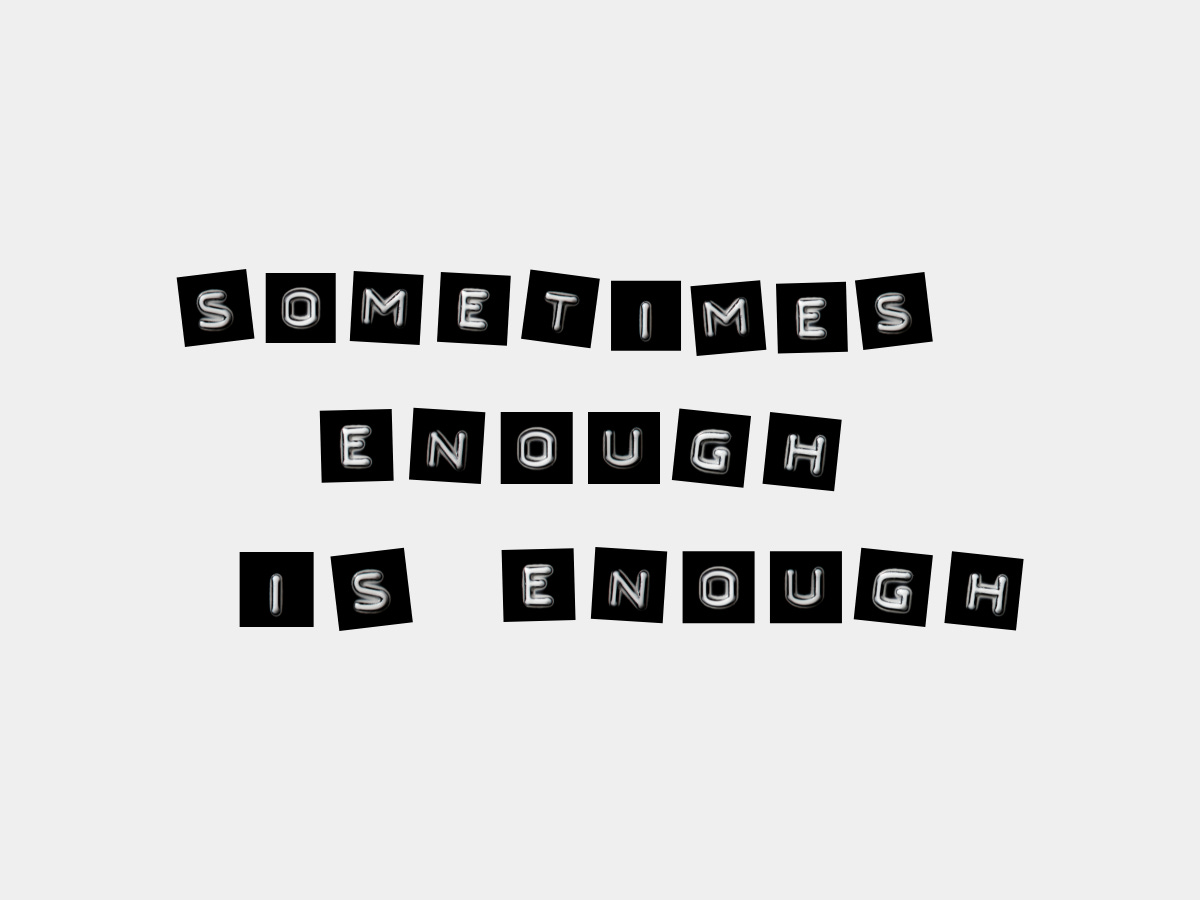
Having Had Enough
We have made it to the last territory of enough that I will traverse today—but one that feels extra important. This past year has tested me in new, brilliant, and brutal ways—as the years often do. This year I learned this lesson tenfold. What a blessing and a curse it can be to reach your limit. During this time, Cleo Wade, another wordsmith, helped me weather the stormier days with her beautiful book, Remember Love—and this particular passage that I read like a psalm every morning, or moment I found myself doubting, hurting, or just needing a lift.
I’ve shared the passage below for you, and I highly encourage you to purchase her book Remember Love (might I add the e-book allows you to keep it on that phone in your pocket for emergency calls 🛟) to keep close for the days that try to break you.
I have so much to say about having had enough—the tell-tale signs, the checkboxes you can tick on the path to recognition—and maybe that will be another post for another day. Today, however, is just about recognizing the notion that we can—and certainly will in our lifetime—have moments where we have reached the limit, our limit, of enough. When enough becomes too much. If this knowledge feels new to you—hello and welcome, it’s nice to meet you.
I can and will read this passage again and again. The idea that you can love yourself enough to walk out of the rooms that harm you in any way feels, at times, a necessity, and in other moments novel—and yet it is always true. Read—walk out of any damn rooms you need to. You can walk back in when the time is right, or you can close the door and not look back—I’ll leave that to you. But I’ll say, where there is harm there is no room for growth. So as Cleo so beautifully reminds us (and Pamela and Bree in their words too):
“Love yourself enough to say enough is enough when enough has become enough.” - Cleo Wade
There you go—the many edges of enough. Feel them out, explore the ways you measure or challenge your enoughness, and let me know in the comments where you agree, disagree, or even just what you’ve had enough with. I’m here to listen, or simply acknowledge. Enough for now—your turn. What’s your ‘enough’? ;)
Xx
Katie
Thank you for reading Question for you!
P.S. If you liked this post, hit that little heart! It helps boost the algorithm so others who might need these words can find it more easily. I’ll make sure to send some love back your way! ❤️


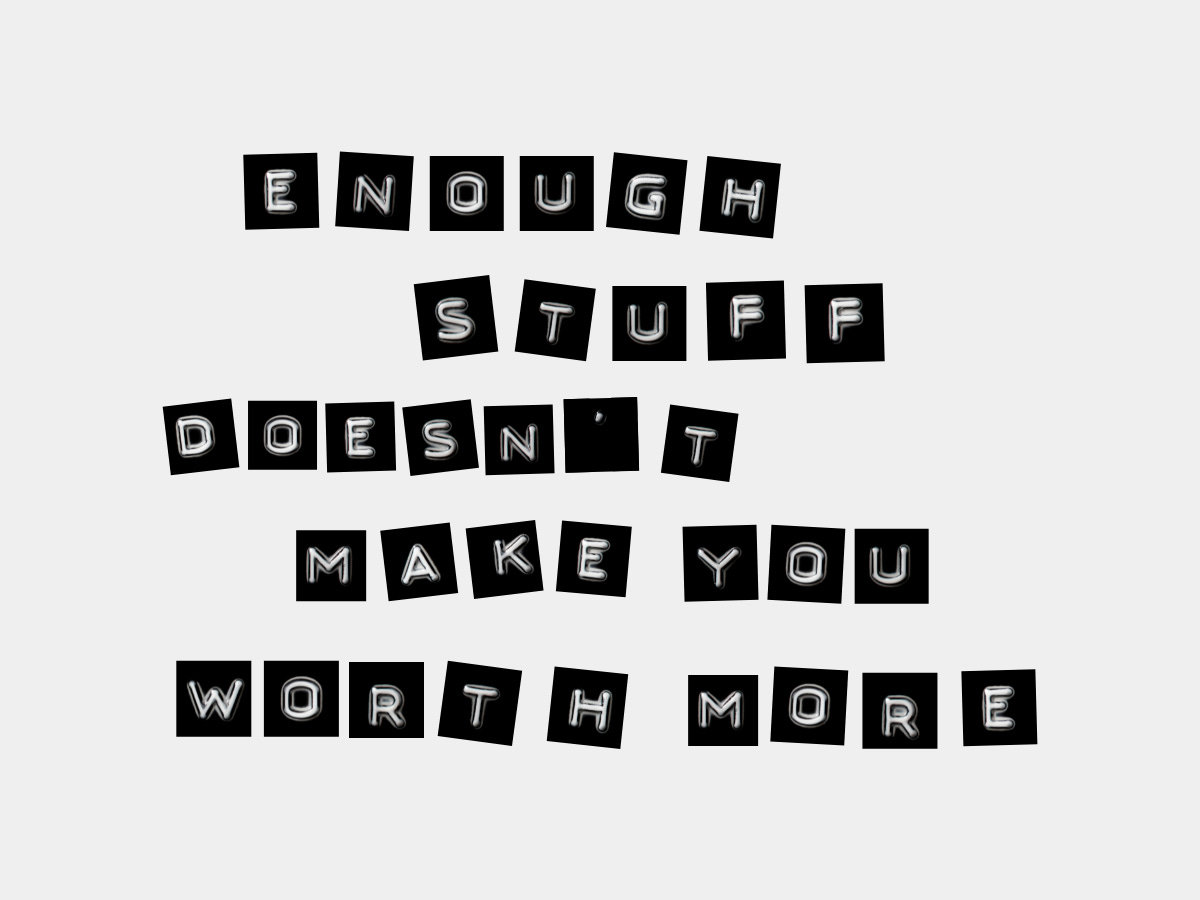

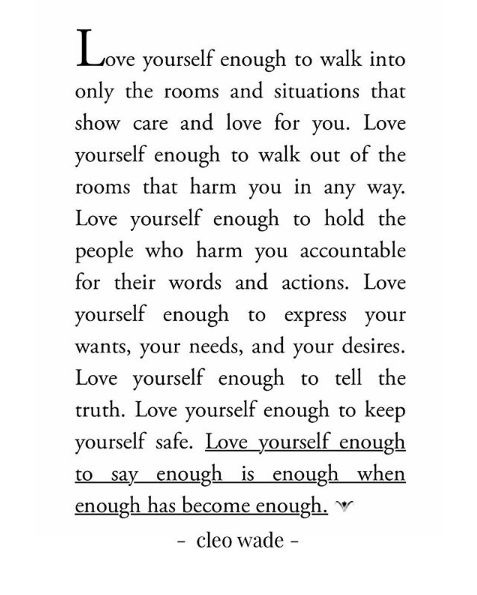
I am doing enough, I have enough, I am enough ❤️❤️❤️❤️❤️❤️❤️❤️❤️❤️❤️❤️